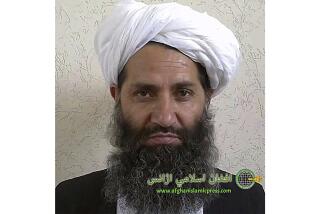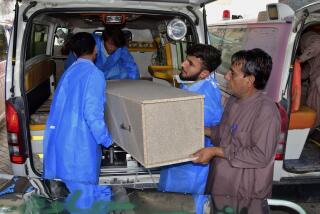A night of terror at the hands of the Taliban
Reporting from Kabul, Afghanistan — It was 1 a.m. when the shouts awoke Ay Noor Uzbik.
“Your mobile!” the masked gunman screamed, holding a sack to collect the phones and money of the dozens of other passengers on the bus.
Doing as she was told, Uzbik took in the scene that had unfolded while she slept. The bus -- near the tail-end of a 14-hour drive from Kabul to the northeastern province of Badakhshan -- was filled with masked gunmen.
The ordeal that followed was replicated on several other vehicles early Tuesday, as passengers were held hostage by Taliban fighters. At least 10 people were killed.
A native of Badakhshan province, Uzbik, 28, had made the trip to and from Kabul countless times.Though the road leading from Kabul to the northern provinces has become increasingly dangerous in the last three years, she had not been especially worried about safety on this trip, which she took with her sister and two brothers.
Uzbik now recalls the experience as a series of panicked flashes.
I kept thinking this is it, this is the last moment of my life.
— Ay Noor Uzbik
It was when they heard the cries coming from the white-bearded driver that Uzbik and her brothers, 11 and 22, and her sister, 19, realized that the gunmen were more than just highway bandits.
“They were attacking the driver, beating him with their guns,” she said in a telephone interview.
The driver, described as an old man, refused to budge. This, said Uzbik, further incensed the gunmen who began to shoot at his hands and feet.
Growing tired of the tussle, the men eventually threw the driver out of the bus.
With one of the armed men now driving the bus, Uzbik said, the vehicle’s mirrors were battered by passing trees and debris.
“It was like a horrific scene out of a terrible dream,” she said.
Eventually, the bus pulled over on a side road on the outskirts of the northern city of Kunduz. Uzbik said that was when the fear truly began to set in.
“I kept thinking this is it, this is the last moment of my life,” she said.
With the bus hidden under the cover of night, the masked men began to search each passenger.
Uzbik feared that the contents of her bag -- documents from a women’s rights workshop she had just attended in Kabul -- would be discovered. But the gunmen never searched her, or any other female passenger.
“They kept saying: ‘Don’t worry, you are our sisters, no harm will come to you,’” she said.
Instead, they began to round up the men, including her 22-year-old brother.
Fearing for her brother’s life, Uzbik dropped to the ground and begged at the gunmen’s feet.
Again, they reassured her that no harm would come to her or her sister, but did not release her brother. Instead, they turned off the bus and began to take the hostages, including her brother, with them.
Within a few minutes, the remaining passengers, realizing the bus had been abandoned, began to flee. “Hurry or they’ll come back,” she recalled them saying as the ran out into the dark night.
But the Uzbik siblings, paralyzed by fear for their brother, waited in the bus for several hours, unsure of his fate.
Eventually, a local man appeared and told them not to worry. He said the hostages would be released soon. At 7 a.m. their prayers were answered, as their brother came rushing through the morning light to embrace them.
“They told him ‘Take your women and leave the area immediately, we are letting you go out of respect for them,’” she said.
Other families weren’t as lucky.
Noorullah, a resident of the Yawan district of Badakhshan province who uses only one name, received a call Tuesday telling him his cousin, Shams-ur Rahman, had been killed.
Rahman, 25, was heading back to Badakhshan from Kabul after asking his commanding officer in the Afghan National Army if he could have time off to spend time with his new bride. They had been married for 15 days.
He was on another bus to Kabul when he was killed.
According to local authorities, the Uzbik siblings and Shams-ur Rahman were among 185 people aboard three buses and several other vehicles who were held hostage by Taliban forces. While most were released, 10 are believed to still be held.
The Taliban issued a statement Wednesday claiming responsibility for the action, describing the detainees as “enemy troops.” The incident sent shock waves throughout Afghanistan.
President Ashraf Ghani lambasted the group’s newly elected leader, Haibatullah Akhundzada, for the brutality of the kidnappings and shootings.
Ghani took aim at statements that Akhundzada is a learned man and a teacher, saying whoever ordered the act “had no knowledge of religion.”
Abdullah Abdullah, the chief executive of the national unity government, took an equally harsh tone in a series of tweets.
“I am shocked by the unjustifiable and unreasonable killing of our innocent people by coward Taliban in Kunduz …. What Taliban did today is more of an act of wild animals than just a war crime against the innocent Afghan civilians. We sought a dignified peace with those who quit violence, not with these puppets of foreign intelligence who enjoy the blood of Afghans,” he wrote.
However, it’s not just the Kabul government that has criticized the leading Taliban group for the incident for which it is blamed.
Manan Niazi, the deputy of a breakaway Taliban group that is challenging Akhundzada’s legitimacy, condemned the act and vowed to avenge those who lost their lives.
In a statement that seemed to echo Abdullah’s and Ghani’s, Niazi said those gunmen who killed unarmed passengers carried out an un-Islamic act. He went on to say that they are Pakistani puppets, a claim often lodged against the Taliban.
Separately, authorities said armed Taliban insurgents on Wednesday beheaded two people and left their bodies next to the road in Kunduz, according to local media.
Latifi and Ehsan are special correspondents.
MORE ON TALIBAN
New Taliban leader is seen as more a teacher than a fighter, but don’t expect attacks to end
Taliban leader Mullah Mansour believed killed in U.S. drone strike in Pakistan
Obama on Taliban leader’s death: U.S. strike doesn’t change military role in Afghanistan
More to Read
Sign up for Essential California
The most important California stories and recommendations in your inbox every morning.
You may occasionally receive promotional content from the Los Angeles Times.










